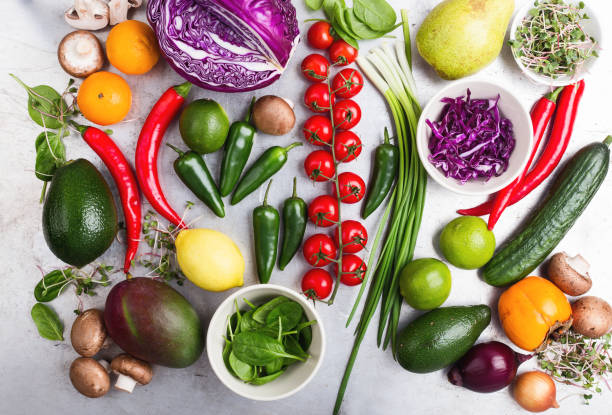
Plant-based diets are all the rave due to their many health benefits. For example, research shows that plant-based diets may help Blacks as they age. Many people have already made the switch to a plant-based diet and if you a considering it as an option to get to a healthier you, we just may have something to sway your vote. Women who follow a healthy plant-based diet after menopause appear to face a substantially lower risk for breast cancer, new French research indicates.
How a plant-based diet helps
After tracking more than 65,000 women for two decades, investigators found those who consumed a healthy, primarily plant-based diet saw their risk of developing any type of breast cancer drop by an average of 14%.
But the accent is on "healthy." Breast cancer risk fell only among women whose diets included a significant amount of whole grains, fruit, vegetables, nuts, legumes, vegetable oils and tea or coffee -- even if red meat and poultry occasionally figured into the equation.
The type of plant foods you are consuming play a major role in the level of benefit you will receive, however. If you're used to consuming fruit juices, refined grains, potatoes, sugar-sweetened beverages and/or desserts, here's your sign to change your diet. Consuming these foods on a daily basis will essentially overrule your carefully planned plant-based diet, providing you no protective benefits. In fact, women that regularly consumed these foods actually saw their breast cancer risk rise by about 20%.
Study lead author Sanam Shah says the findings "highlight that increasing the consumption of healthy plant foods, and decreasing the consumption of less healthy plant foods, might help prevent all types of breast cancer."
But the caveat, she adds, is clear: "Not all plant-based diets are equally healthy."
Given that in general "diets excluding meat generally have a 'positive' health image," some people might find that conclusion surprising, says Shah, a PhD student in epidemiology at Paris-Saclay University in France.
RELATED: No Meat in Stores, Try One of These 5 Plant-Based Diets
Do you have to eliminate meat altogether?
For the meat lovers out there, this study also shows that you don't have to do away with meat altogether.
Shah and her colleagues did not focus on women who cut out meat entirely. None of the women were vegetarian or vegan.
Instead, the investigators honed in on women whose diets included some meat and poultry while still being primarily plant-based, proving that much like everything else in your life, the key to a healthier life is balance.
For the study, the French female participants (average age 53) completed nutritional questionnaires in 1993 and again in 2005. The women were classified as following either a mostly animal-based diet or a diet that's mostly plant-based. Over an average tracking period of about 21 years, nearly 4,000 of the women developed breast cancer.
The study team found that those who tended to eat the healthiest plant-based foods faced a notably lower breast cancer risk; those who consumed the least healthy plant-based diets saw their risk rise considerably.
As to why, Shah theorized that the high fiber content of healthier plant-based diets "may lower cancer risk via anti-inflammatory and antioxidant effects."
But she also stresses that more research will be needed, as "the causal mechanisms of the link between healthy plant-based diets and breast cancer risk have yet to be entirely determined."
Shah also cautions that it remains unclear whether the findings might apply to younger women. That's because "differences exist between premenopausal and postmenopausal breast cancers in regards to the development of breast cancer."
Lona Sandon, a nutrition specialist in Dallas, agrees that more research will be needed.
Getting started with your plant-based diet
So, as it stands, yes you can benefit from a plant diet. And the younger you start, the better odds you have. Think of it as a win-win for your health.
So, now that we've established the benefits of a plant diet, how do you determine what's healthy and what's not?
"What distinguishes the difference between a healthy plant-based food and an unhealthy plant-based food is largely the processing or preparation method," Sandon notes. "In general, the more processing, the more diminished quality due to changes in nutrients or added ingredients."
With that distinction in mind, there "does not appear to be a downside to choosing minimally processed plant-based foods for anyone when it comes to cancer risk," she adds.
"However, we need to be realistic in expectations," Sandon cautions. "If you wait until you are 55, damaged or cancer cells may already have started to progress. So your benefit of risk-lowering is likely to be much less, compared to if you had been eating a healthy plant-based diet since your 20s."
Looking to get started, but not sure where to start? A healthy plant-based diet is easy to follow if you break it down into five groups:
- Fruits: Any type of fruit including apples, bananas, grapes, strawberries, citrus fruits, etc.
- Vegetables: Veggies including peppers, corn, lettuce, spinach, kale, peas, collards, etc.
- Tubers: Root vegetables like potatoes, carrots, parsnips, sweet potatoes, etc.
- Whole grains: Grains, cereals, and other starches in whole form, such as quinoa, brown rice, whole wheat, oats, popcorn, etc.
- Legumes: Beans of any kind, plus lentils, pulses, etc.
Other great options include nuts, seeds, avocados, tofu, tempeh, whole-grain flours and breads, and plant-based milks. However, because these options are calorie-dense, they can contribute to weight gain. Remember to eat them in moderation.
As you can see, there is no shortage of tasty plant-based options, so happy meal planning!








